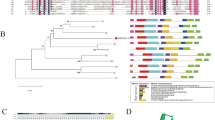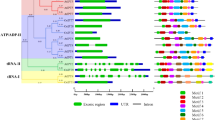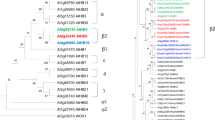Abstract
Key message
Overexpression in rice of the isolated salt-responsive WRKY114 gene from maize resulted in decreases in both salt-stress tolerance and abscisic acid sensitivity by regulating stress- and abscisic acid-related gene expression.
Abstract
WRKYs are an important family of transcription factors that widely participate in plant development, defense regulation and stress responses. In this research, WRKY114 encoding a WRKY transcription factor was cloned from maize (Zea mays L.). ZmWRKY114 expression was down-regulated by salt stress but up-regulated by abscisic acid (ABA) treatments. ZmWRKY114 is a nuclear protein with no transcriptional activation ability in yeast. A yeast one-hybrid experiment confirmed that ZmWRKY114 possesses an ability to specifically bind to W-boxes. The heterologous overexpression of ZmWRKY114 in rice enhanced the salt-stress sensitivity as indicated by the transgenic plants having reduced heights, root lengths and survival rates under salt-stress conditions. In addition, transgenic plants also retained lower proline contents, but greater malondialdehyde contents and relative electrical leakage levels. Additionally, ZmWRKY114-overexpressing plants showed less sensitivity to ABA during the early seedling growth stage. Further analyses indicated that transgenic rice accumulated higher levels of ABA than wild-type plants under salt-stress conditions. Transcriptome and quantitative real-time PCR analyses indicated that a few regulatory genes, which play vital roles in controlling plant stress responses and/or the ABA signaling pathway, were affected by ZmWRKY114 overexpression when rice was treated with NaCl. Thus, ZmWRKY114 may function as a negative factor that participates in salt-stress responses through an ABA-mediated pathway.








Similar content being viewed by others
Abbreviations
- ABA:
-
Abscisic acid
- DEG:
-
Differentially expressed gene
- GO:
-
Gene ontology
- MDA:
-
Malondialdehyde
- RT-PCR:
-
Quantitative real-time
- PCRREL:
-
Relative electrolytic leakage
- TF:
-
Transcription factor
References
Ábrahám E, Hourton-Cabassa C, Erdei L, Szabados L (2010) Methods for determination of proline in plants. Plant stress tolerance. Springer, Berlin, pp 317–331
Bencke M, Cabreira C, Strohm BW, Neto LB, Mancini E, Osorio MB, Homrich MS, Zolet AC, De Carvalho MC, Stolf R (2014) Genome-wide annotation of the soybean WRKY family and functional characterization of genes involved in response to Phakopsora pachyrhizi infection. BMC Plant Biol 14(1):236
Burssens S, Himanen K, Van dCB, Beeckman T, Van MM, Inzé D, Verbruggen N (2000) Expression of cell cycle regulatory genes and morphological alterations in response to salt stress in Arabidopsis thaliana. Planta 211(5):632–640
Cai RH, Yang Z, Wang YF, Lin YX, Peng XJ, Qian L, Chang Y, Jiang HY, Xiang Y, Cheng BJ (2014) Overexpression of a maize WRKY58 gene enhances drought and salt tolerance in transgenic rice. Plant Cell Tiss Org 119(3):565–577
Cai RH, Dai W, Zhang CS, Wang Y, Wu M, Zhao Y, Ma Q, Xiang Y, Cheng BJ (2017) The maize WRKY transcription factor ZmWRKY17 negatively regulates salt stress tolerance in transgenic Arabidopsis plants. Planta 246(6):1215–1231
Cao J, Yao D, Lin F, Jiang M (2014) PEG-mediated transient gene expression and silencing system in maize mesophyll protoplasts: a valuable tool for signal transduction study in maize. Acta Physiol Plant 36(5):1271–1281
Chen L, Yu S, Li S, Zhang L, Zou C (1819) Yu D (2012) The role of WRKY transcription factors in plant abiotic stresses. Biochim Biophys Acta 2:120–128
Chi Y, Yang Y, Zhou Y, Zhou J, Fan B, Yu JQ, Chen Z (2013) Protein-protein interactions in the regulation of WRKY transcription factors. Mol Plant 6(2):287–300
Ciolkowski I, Wanke D, Birkenbihl RP, Somssich IE (2008) Studies on DNA-binding selectivity of WRKY transcription factors lend structural clues into WRKY-domain function. Plant Mol Biol 68(1–2):81–92
Duan MR, Nan J, Liang YH, Peng M, Lu L, Lf Li, Wei Ch, Lai Lh, Li Y, Su XD (2007) DNA binding mechanism revealed by high resolution crystal structure of Arabidopsis thaliana WRKY1 protein. Nucleic Acids Res 35(4):1145–1154
Eulgem T, Rushton PJ, Robatzek S, Somssich IE (2000) The WRKY superfamily of plant transcription factors. Trends Plant Sci 5(5):199–206
Fei C, Marianna F, Giovanni Battista T, Silvia DS, Mario P, Liangsheng Z, Bin C, Zong MC (2013) The evolutionary history and diverse physiological roles of the grapevine calcium-dependent protein kinase gene family. PLoS One 8(12):e80818
Ganguly M, Datta K, Roychoudhury A, Gayen D, Sengupta DN, Datta SK (2012) Overexpression of Rab16A gene in indica rice variety for generating enhanced salt tolerance. Plant Signal Behav 7(4):502–509
Garrido JMG, Morcillo RJL, Rodríguez JÁM, Bote JAO (2010) Variations in the mycorrhization characteristics in roots of wild-type and ABA-deficient tomato are accompanied by specific transcriptomic alterations. Mol Plant Microbe In 23(5):651–664
Ge LF, Chao DY, Shi M, Zhu MZ, Gao JP, Lin HX (2008) Overexpression of the trehalose-6-phosphate phosphatase gene OsTPP1 confers stress tolerance in rice and results in the activation of stress responsive genes. Planta 228(1):191–201
Hiei Y, Ohta S, Komari T, Kumashiro T (1994) Efficient transformation of rice (Oryza sativa L.) mediated by Agrobacterium and sequence analysis of the boundaries of the T-DNA. Plant J 6(2):271–282
Hiroshi A, Takeshi U, Takuya I, Motoaki S, Kazuo S, Kazuko YS (2003) Arabidopsis AtMYC2 (bHLH) and AtMYB2 (MYB) function as transcriptional activators in abscisic acid signaling. Plant Cell 15(1):63–78
Hong CY, Hsu YT, Tsai YC, Kao CH (2007) Expression of ASCORBATE PEROXIDASE 8 in roots of rice (Oryza sativa L.) seedlings in response to NaCl. J Exp Bot 58(12):3273–3283
Hong C, Cheng D, Zhang G, Zhu D, Chen Y, Tan M (2016) The role of ZmWRKY4 in regulating maize antioxidant defense under cadmium stress. Biochem Bioph Res Co 482(4):1504
Hu H, You J, Fang Y, Zhu X, Qi Z, Xiong L (2010) Characterization of transcription factor gene SNAC2 conferring cold and salt tolerance in rice. Plant Mol Biol 72(4–5):567–568
Hu Y, Chen L, Wang H, Zhang L, Wang F, Yu D (2013) Arabidopsis transcription factor WRKY8 functions antagonistically with its interacting partner VQ9 to modulate salinity stress tolerance. Plant J 74(5):730–745
Huda KMK, Banu MSA, Bharti G, Suresh T, Renu T, Narendra T (2013) OsACA6, a P-type IIB Ca2+ ATPase promotes salinity and drought stress tolerance in tobacco by ROS scavenging and enhancing the expression of stress-responsive genes. Plant J 76(6):997–1015
Ishiguro S, Nakamura K (1994) Characterization of a cDNA encoding a novel DNA-binding protein, SPF1, that recognizes SP8 sequences in the 5′ upstream regions of genes coding for sporamin and β-amylase from sweet potato. Mol Gen Genet 244(6):563–571
Jakoby M, Weisshaar B, Dröge-Laser W, Vicente-Carbajosa J, Tiedemann J, Kroj T, Parcy F (2002) bZIP transcription factors in Arabidopsis. Trends Plant Sci 7(3):106–111
Joohyun K, Jae-Ung H, Miyoung L, Yu-Young K, Assmann SM, Enrico M, Youngsook L (2010) PDR-type ABC transporter mediates cellular uptake of the phytohormone abscisic acid. Proc Natl Acad Sci USA 107(5):2355–2360
Li D, Zhang Y, Hu X, Shen X, Ma L, Su Z, Wang T, Dong J (2011) Transcriptional profiling of Medicago truncatula under salt stress identified a novel CBF transcription factor MtCBF4 that plays an important role in abiotic stress responses. BMC Plant Biol 11(1):109
Li H, Gao Y, Dai Y, Deng D, Chen J (2013) ZmWRKY33, a WRKY maize transcription factor conferring enhanced salt stress tolerances in Arabidopsis. Plant Growth Regul 70(3):207–216
Li P, Song A, Gao C, Wang L, Wang Y, Sun J, Jiang J, Chen F, Chen S (2015) Chrysanthemum WRKY gene CmWRKY17 negatively regulates salt stress tolerance in transgenic chrysanthemum and Arabidopsis plants. Plant Cell Rep 34(8):1365–1378
Liu ZQ, Yan L, Wu Z, Mei C, Lu K, Yu YT, Liang S, Zhang XF, Wang XF, Zhang DP (2012) Cooperation of three WRKY-domain transcription factors WRKY18, WRKY40, and WRKY60 in repressing two ABA-responsive genes ABI4 and ABI5 in Arabidopsis. J Exp Bot 63(18):6371–6392
Liu QL, Zhong M, Li S, Pan YZ, Jiang BB, Jia Y, Zhang HQ (2013) Overexpression of a chrysanthemum transcription factor gene, DgWRKY3, in tobacco enhances tolerance to salt stress. Plant Physiol Bioch 69(8):27–33
Liu L, Zhang Z, Dong J, Wang T (2016) Overexpression of MtWRKY76 increases both salt and drought tolerance in Medicago truncatula. Environ Exp Bot 123:50–58
Marè C, Mazzucotelli E, Crosatti C, Francia E, Am Stanca, Cattivelli L (2004) HvWRKY38: a new transcription factor involved in cold- and drought-response in barley. Plant Mol Biol 55(3):399–416
Marshall K, Ashwil K, Ndiko L (2012) Caspase-like enzymatic activity and the ascorbate-glutathione cycle participate in salt stress tolerance of maize conferred by exogenously applied nitric oxide. Plant Signal Behav 7(3):349–360
Matsuda S, Funabiki A, Furukawa K, Komori N, Koike M, Tokuji Y, Takamure I, Kato K (2012) Genome-wide analysis and expression profiling of half-size ABC protein subgroup G in rice in response to abiotic stress and phytohormone treatments. Mol Genet Genomics 287(10):819–835
Mittler R, Vanderauwera S, Gollery M, Breusegem FV (2004) Reactive oxygen gene network of plants. Trends Plant Sci 9(10):490–498
Munns R, Tester M (2008) Mechanisms of salinity tolerance. Annu Rev Plant Biol 59(1):651–681
Park CY, Lee JH, Yoo JH, Moon BC, Choi MS, Kang YH, Lee SM, Kim HS, Kang KY, Chung WS, Lim CO (2005) WRKY group IId transcription factors interact with calmodulin. FEBS Lett 6:1545–1550
Pillai SE, Kumar C, Patel HK, Sonti RV (2018) Overexpression of a cell wall damage induced transcription factor, OsWRKY42, leads to enhanced callose deposition and tolerance to salt stress but does not enhance tolerance to bacterial infection. BMC Plant Biol 18(1):177
Qiao Z, Li CL, Zhang W (2016) WRKY1 regulates stomatal movement in drought-stressed Arabidopsis thaliana. Plant Mol Biol 91(1–2):53–65
Ross CA, Liu Y, Shen QJ (2007) The WRKY gene family in rice (Oryza sativa). J Integr Plant Biol 49(6):827–842
Rushton PJ, Somssich IE, Ringler P, Shen QJ (2010) WRKY transcription factors. Trends Plant Sci 15(5):247–258
Rushton DL, Tripathi P, Rabara RC, Lin J, Ringler P, Boken AK, Langum TJ, Smidt L, Boomsma DD, Emme NJ (2012) WRKY transcription factors: key components in abscisic acid signalling. Plant Biotechnol J 10(1):2–11
Schmidt R, Schippers JH, Welker A, Mieulet D, Guiderdoni E, Mueller-Roeber B (2012) Transcription factor OsHsfC1b regulates salt tolerance and development in Oryza sativa ssp. japonica. AoB Plants. https://doi.org/10.1093/aobpla/pls011
Sripinyowanich S, Klomsakul P, Boonburapong B, Bangyeekhun T, Asami T, Gu H, Buaboocha T, Chadchawan S (2013) Exogenous ABA induces salt tolerance in indica rice (Oryza sativa L.): the role of OsP5CS1 and OsP5CR gene expression during salt stress. Environ Exp Bot 86:94–105
Székely G, Ábrahám E, Cséplő Á, Rigó G, Zsigmond L, Csiszár J, Ayaydin F, Strizhov N, Jásik J, Schmelzer E, Koncz C, Szabados L (2008) Duplicated P5CS genes of Arabidopsis play distinct roles in stress regulation and developmental control of proline biosynthesis. Plant J 53(1):11–28
Tao Z, Kou Y, Liu H, Li X, Xiao J, Wang S (2011) OsWRKY45 alleles play different roles in abscisic acid signalling and salt stress tolerance but similar roles in drought and cold tolerance in rice. J Exp Bot 62(14):4863–4874
Thoenes E, Dixit S, Pereira A, Aharoni A, Van Rooy G, Jetter R (2004) The SHINE clade of AP2 domain transcription factors activates wax biosynthesis, alters cuticle properties, and confers drought tolerance when overexpressed in Arabidopsis. Plant Cell 16(9):2463–2480
Tian X, Wang Z, Li X, Lv T, Liu H, Wang L, Niu H, Bu Q (2015) Characterization and functional analysis of pyrabactin resistance-like abscisic acid receptor family in rice. Rice 8(1):28
Tripathi P, Rabara RC, Langum TJ, Boken AK, Rushton DL, Boomsma DD, Rinerson CI, Rabara J, Reese RN, Chen X (2012) The WRKY transcription factor family in Brachypodium distachyon. BMC Genomics 13(1):270
Ülker B, Somssich IE (2004) WRKY transcription factors: from DNA binding towards biological function. Curr Opin Plant Biol 7(5):491–498
Ullah A, Sun H, Hakim Yang X, Zhang X (2017) A novel cotton WRKY-gene, GhWRKY6-like, improves salt tolerance by activating the ABA signalling pathway and scavenging of reactive oxygen species. Physiol Plantarum 162:4
Wang X, Zeng J, Li Y, Rong X, Sun J, Sun T, Li M, Wang L, Feng Y, Chai R (2015) Expression of TaWRKY44, a wheat WRKY gene, in transgenic tobacco confers multiple abiotic stress tolerances. Front Plant Sci 6:615
Wang CT, Ru JN, Liu YW, Li M, Zhao D, Yang JF, Fu JD, Xu ZS (2018) Maize WRKY transcription factor ZmWRKY106 confers drought and heat tolerance in transgenic plants. Int J Mol Sci 19(10):3046
Wang M, Wang Y, Zhang Y, Li C, Gong S, Yan S, Li G, Hu G, Ren H, Yang J (2019) Comparative transcriptome analysis of salt-sensitive and salt-tolerant maize reveals potential mechanisms to enhance salt resistance. Genes Genom
Wei KF, Chen J, Chen YF, Wu LJ, Xie DX (2012) Molecular phylogenetic and expression analysis of the complete WRKY transcription factor family in maize. DNA Res 19(2):153–164
Wu XL, Shiroto Y, Kishitani S, Ito Y, Toriyama K (2009) Enhanced heat and drought tolerance in transgenic rice seedlings overexpressing OsWRKY11 under the control of HSP101 promoter. Plant Cell Rep 28(1):21–30
Xie Z, Zhang ZL, Zou XL, Huang J, Ruas P, Thompson D, Shen QX (2005) Annotations and functional analyses of the rice WRKY gene superfamily reveal positive and negative regulators of abscisic acid signaling in aleurone cells. Plant Physiol 137(1):176–189
Xu N, Chu Y, Chen H, Li X, Wu Q, Jin L, Wang G, Huang J (2018) Rice transcription factor OsMADS25 modulates root growth and confers salinity tolerance via the ABA–mediated regulatory pathway and ROS scavenging. PLoS Genet 14(10):e1007662
Yang S, Huang F, Hu XC, Qin Q, Huang LY, Wang WS, Fu BY (2015) Effect of salt and ABA on gene expression of MYB transcription factor in rice. J Agr Sci Tech-iran 17(4):15–22
Zeng DE, Pei H, Xiao F, Liu Y (2014) Overexpressing a novel RING-H2 finger protein gene, OsRHP1, enhances drought and salt tolerance in rice (Oryza sativa L.). J Plant Biol 57(6):357–365
Zhang J, Jia W, Yang J, Ismail AM (2006) Role of ABA in integrating plant responses to drought and salt stresses. Field Crops Research 97(1):111–119
Zhang S, Li N, Gao F, Yang A, Zhang J (2010) Over-expression of TsCBF1 gene confers improved drought tolerance in transgenic maize. Mol Breeding 26(3):455–465
Zhang S, Haider I, Kohlen W, Jiang L, Bouwmeester H, Meijer AH, Schluepmann H, Liu CM, Ouwerkerk PBF (2012) Function of the HD-Zip I gene Oshox22 in ABA-mediated drought and salt tolerances in rice. Plant Mol Biol 80(6):571–585
Zhang Y, Yu H, Yang X, Li Q, Ling J, Wang H, Gu X, Huang S, Jiang W (2016) CsWRKY46, a WRKY transcription factor from cucumber, confers cold resistance in transgenic-plant by regulating a set of cold-stress responsive genes in an ABA-dependent manner. Plant Physiol Bioch 108:478–487
Zhao Y, Ma Q, Jin XL, Peng XJ, Liu JY, Deng L, Yan HW, Sheng L, Jiang HY, Cheng BJ (2014) A novel maize homeodomain-leucine zipper (HD-Zip) I gene, Zmhdz10, positively regulates drought and salt tolerance in both rice and Arabidopsis. Plant Cell Physiol 55(6):1142–1156
Zhu JK (2002) Salt and drought stress signal transduction in plants. Annu Rev Plant Biol 2002:53
Acknowledgements
This work was supported by the National Natural Science Foundation of China (31801365), the Major Science and Technology Projects of Anhui Province (18030701180) and the China Postdoctoral Science Foundation (1808085QC88).
Author information
Authors and Affiliations
Contributions
QM, BC and RC conceived and designed the research; CB, HC, GL, WL and XZ performed the experiments; CB and RC wrote the manuscript. All the authors read and approved the final manuscript.
Corresponding author
Ethics declarations
Conflict of interest
The authors declare that the research was conducted in the absence of any commercial or financial relationships that could be construed as a potential conflicts of interest.
Additional information
Communicated by Prakash Lakshmanan.
Publisher's Note
Springer Nature remains neutral with regard to jurisdictional claims in published maps and institutional affiliations.
Electronic supplementary material
Below is the link to the electronic supplementary material.
Fig. S1
Reduced salt tolerance in the heading stage period of ZmWRKY114 transgenic rice plants (TIFF 7221 kb)
Fig. S2
Gene ontology (GO) classification of the unigenes from three comparisons of WT, OE6 and OE8 between normal and salt-stress conditions. a Enriched GO terms in WB vs WA. b Enriched GO terms in OB6 vs OA6. c Enriched GO terms in OB8 vs OA8. WB and WA represent WT plants before and after exposure to salt stress. OB6 and OA6 represent transgenic line OE6 before and after exposure to salt stress. OB8 and OA8 represent transgenic line OE8 before and after exposure to salt stress (TIFF 10146 kb)
Fig. S3
Expression levels of stress- and ABA-related genes in WT and the two transgenic rice lines in response to salt-stress conditions. The induction levels of the genes (EBP-89, Rab16A, SKC1, PYL3, PYL9, APx8, HsfC1b, P5CR, TPP1, NCED3 and NCED5) were measured by qRT-PCR. Actin was used as the internal control. Data represent means ± SDs of three replicates (TIFF 10481 kb)
Rights and permissions
About this article
Cite this article
Bo, C., Chen, H., Luo, G. et al. Maize WRKY114 gene negatively regulates salt-stress tolerance in transgenic rice. Plant Cell Rep 39, 135–148 (2020). https://doi.org/10.1007/s00299-019-02481-3
Received:
Accepted:
Published:
Issue Date:
DOI: https://doi.org/10.1007/s00299-019-02481-3




